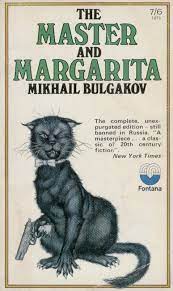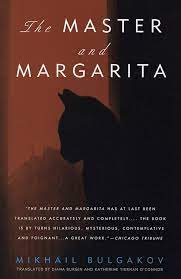The Master and the Margarita (1967 [1928+]) by Mikhail Bulgakov (1891-1940)
Good Reads meta-data is 320 pages rated 4.29 by 364,380 litizens
Genre: Fantasy, satire
Tagline: The devil you say! Yes, I do.
Verdict: Trip without arrival.

A conversation in public park between two savants – one a pompous professor and the other a prosperous poet- is interrupted by a distinguished gentleman who intrudes to correct an assertion the professor made, namely that there was not an historical Jesus. Oh yes, says the interrupter, there was and proceeds to recount Pontiac (spellchecker bite) Pilate’s interview of this man, a telling that does not quite accord with the gospels, but these, according to the professor, are indeed fiction. But the gentleman named Woland insists his account is true, because he witnessed it!
Thus the pair suppose Woland to be a lunatic. But we readers, thanks to the blurb, know better. He’s a charming devil and that is the literal truth. In the translation I read, there are many references to the devil and to god. How did that sit with the Comrades at the time, I wonder. Had they not yet become godless communists?
The stories thereafter proceed in parallel as we find out more about Pilate and witness the superficial corruption of the new approved artistic elite of Moscow who are beguiled by prestidigitator Woland whose entourage include a large talking cat with a taste for vodka and a witch with a Boeing broom stick for flight.
The Master and Margarita (the Qantas broom stick was late arriving) only enter in the second act and through many trials and tribulations (see above) they achieve a certain kind of survival in limbo, resonant of Dante’s Purgatorio.

The book has a varied and vexed publication history. It was written over a period of years, and in regime thaws parts of it were published with heavy censorship, while several samizdat versions came and went, but it was not until 1967 the version I have was published. I read this same version shortly after publication as a student and recall liking it, although on this reading I found the string of incidents tedious since there seemed to be no purpose but the string itself.

